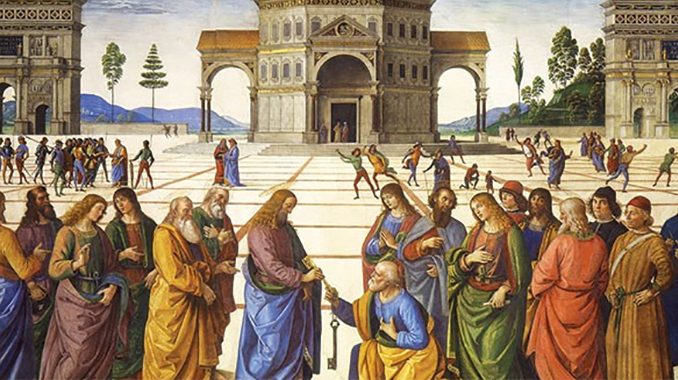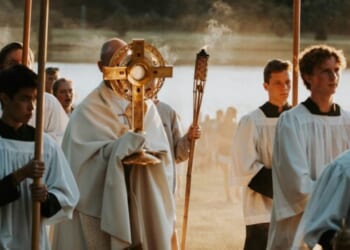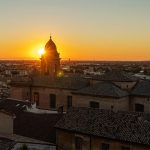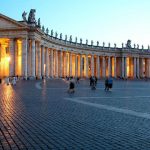
Since the death of the first pope, Saint Peter, two hundred and sixty-five men have succeeded him in that office. And now, following the death and burial of Pope Francis, we can consider how the examples of some of the greatest popes in Church history can inspire us to hope as we await the election of our next pope.
Of Saint Peter’s successors (not counting anti-popes), only four have been nicknamed “the Great”. This title is not granted by a complicated Vatican procedure but is instead granted by the Body of Christ. That is, throughout history, there have been four men who have reigned in such an extraordinary way that the Catholic laity have spontaneously given them the title of “the Great” after their deaths.
It’s important to note that calling a pope great is not the same thing as saying he is a strong leader or a great man or even a saint.
For example, one could argue that Pope Julius II (r. 1503-1513) was a strong leader. After all, Julius successfully led armies into battle. But Julius’ nickname among those who knew him was “the Terrible” because of his bad temper. While he is best remembered today for commissioning Michelangelo to paint the ceiling of the Sistine Chapel, Julius was a worldly man who fathered illegitimate children while he was a cardinal, not a saintly pope.
On the other hand, Desiderius (born Dauferi of Benevento) lived a virtuous life before his election as Pope Victor III (r. 1086-1087). Desiderius is now considered one of the greatest abbots of Monte Cassino and an important religious leader in the Hildebrandine reform of the Church. An excellent negotiator, Desiderius was able to develop alliances and establish peace between feuding leaders. But he never wanted to become pope, and, after reluctantly accepting the papacy, he abandoned Rome twice out of frustration with his cardinals, returning to Monte Cassino. He was a great peacemaker, but is not generally considered a great pope.
No one argues that Pope Saint Celestine V (r. 1294) was a holy man. However, his experience as a Benedictine abbot did not prepare him for the thorny diplomatic situations he faced as pope. Recognizing that his indecisive leadership was causing serious problems for the Church, he humbly resigned after only five months.
Of course, the less said about the bad popes—such as the famously selfish, scheming, and immoral Pope Alexander VI (r. 1492-1503)—the better.
However, the great popes can teach us important lessons about how an ordinary man can become an extraordinary pope, by God’s grace. Specifically, Popes Leo I, Gregory I, Nicholas I, and John Paul II show that a man can be a strong leader, a great man, and a faithful Catholic while bearing the heavy responsibility of being the chief shepherd of the Church of Jesus Christ.
Pope Saint Leo I the Great (r. 440-461) was a deacon and held important positions under two popes before being elected to the papal throne. During a contentious council debating Jesus Christ’s human nature, Leo explained our Lord’s possession of both a divine nature and a human nature so clearly that some bishops exclaimed, “Peter has spoken through Leo!”
Today, some historians scoff at the long-standing belief that Pope Leo personally met with Attila the Hun and convinced the warlord to not rape, pillage, and destroy the city of Rome in 452. However, it is a historical fact that the proud Attila diverted his campaign of slaughter away from Rome for no obvious reason other than his meeting with the savvy saint, Pope Leo.
Pope Saint Gregory I the Great (r. 590-604) was born into a wealthy, noble family. He served as prefect of Rome before he set aside his career and decided to establish his own monastic community. He obediently served two popes as a deacon and an ambassador, but he expected to spend his life as an abbot. He was horrified when he was elected pope.
However, he accepted it as God’s will. After all, at the time of his election, the civil government was collapsing, and people of Rome were dying from plagues and famine. Summoning his experience as a government leader, Gregory replaced the dying government with his own, establishing what eventually became known as the medieval papacy.
Pope Gregory ensured that there was enough food to feed the poor, and he ransomed hostages. He instituted Church reforms by placing trustworthy monks in positions of governance, and he sent missionaries to spread the Gospel in pagan territories. He standardized a form of sacred music, which is now called Gregorian chant in his honor. And he influenced the Church through his numerous writings, including hundreds of letters and homilies.
Though less well known than those two popes, Pope Saint Nicholas I the Great (r. 858-867) was a fighter. That is, he fought like a tiger over any attempts to weaken the Church of Christ or Christ’s teachings.
Civil leaders are often fearful about the influence that Church leaders have over their citizens. For example, if a king wanted to declare war against another country, he would not be pleased if the Catholic priests in his kingdom told their parishioners that the proposed war was unjust. Similarly, bishops who opposed unjust taxation and popes who refused to let immoral cronies be given powerful positions within the Church have been threatened and persecuted by civil leaders.
During his reign, Pope Nicholas expected his bishops to act like obedient shepherds, not power-hungry free agents. If his bishops disobeyed him, he made sure that they regretted it. For example, when a king tried to dump his wife for his mistress and two archbishops ratified the new “marriage”, Pope Nicholas reversed their decision and excommunicated the archbishops. Through his actions, Nicholas earned the respect of the rich and powerful, as well as the poor and weak, and taught that the teachings of Christ, particularly the hard ones, should be obeyed.
How does one summarize the pontificate of Pope Saint John Paul II the Great (1978-2005)? Most people today know that Karol Wojtyła was a Polish priest who survived persecution under both Nazism and Communism to become the 263rd successor to Saint Peter. Pope John Paul II was the first non-Italian pope since the sixteenth century, the third-longest-reigning pope in Church history, and a world-traveler who visited 129 countries.
One of the things that made him a great pope was his courageous embodiment of Christian virtue. The man who began his pontificate with the words, “Be not afraid”, did not flinch in proclaiming the uncomfortable truths of the Gospel even when some of his bishops publicly ignored him or when he was shot by an assassin. He developed an insightful, orthodox theology of human sexuality, rooted in his own experience of spending time with ordinary families. He earned doctorates, but could talk to children. He had enemies, but he did not let them distract him from his goals.
Taken together, what do these four men teach about what it means to be a great pope?
These men remind us that the role of the pope is not primarily about shaping world politics or keeping abreast of cultural trends or scientific advancements. A pope should not be focused on his legacy or even his successor.
Instead, the pope is a shepherd tasked with leading every single soul in the world to Jesus Christ. Whether a particular pope has Leo’s diplomatic skills, Gregory’s administrative abilities, Nicholas’ formidable personality, John Paul’s personalism, or something completely different, those talents are given to him by God for the sake of the salvation of souls. Woe to him if he does not make use of those talents as God desires—although this truth is just as dangerous for every Catholic as it is for the pope.
The problems facing a given pope may require him to negotiate with a brutal tyrant, work out a recovery plan from a plague, confront a leader about his sexual sins, or speak out against a dangerous anti-Catholic ideology. Whatever the circumstances, the precise details do not truly matter.
For Jesus Christ is always and everywhere the answer to sin and the problems facing every man, woman, and child in every time and place. He alone is our rock, our salvation, our fortress, and our deliverance (see Psalm 62). Each pope should be directing us straight toward our Good Shepherd: leading us away from heresies, giving us hope in times of darkness, standing up for the truth and beauty of Catholic teaching, and never backing down when we are persecuted for our faith in Christ.
And that—in addition to praying for the repose of Pope Francis’ soul—is what we ordinary Catholics should be praying about now. Only God can turn an ordinary man into a great one, someone worthy of the title of pope, Vicar of Christ, and Supreme Pontiff of the Universal Church. It is our duty to pray that God will make our next pope—whoever he is—worthy of the greatest and humblest of all titles: Servant of the Servants of God.
Endnotes:
If you value the news and views Catholic World Report provides, please consider donating to support our efforts. Your contribution will help us continue to make CWR available to all readers worldwide for free, without a subscription. Thank you for your generosity!
Click here for more information on donating to CWR. Click here to sign up for our newsletter.






